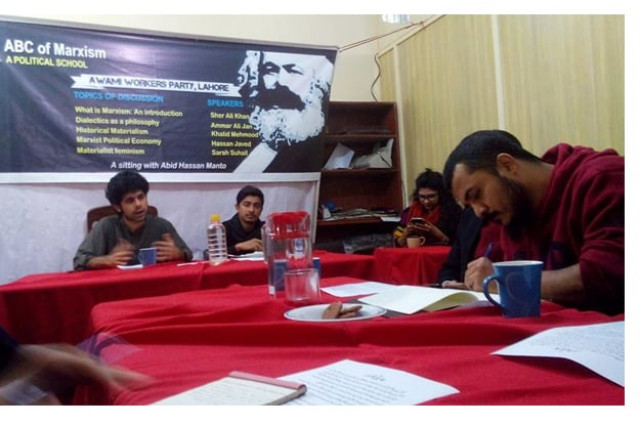Socialist school: ‘Revolutionary politics should build pro-people alternatives’
AWP’s two-day political school concludes

Socialist school: ‘Revolutionary politics should build pro-people alternatives’
The two-day school came to a close on Thursday at the AWP federal secretariat.
Jan’s session on Dialectics as a Philosophy focused on revolutionary politics as a strategic art.
He began the session with a brief introduction of dialectics, in which contradictions between a thesis and an anti-thesis are resolved in the synthesis. He spoke of Hegel’s study of feudal Europe in which internal contradictions emerged in the feudal system which led to a transformation of the system, which Hegel terms “a better system”.
“Once synthesis takes place, there is an emergence of new discursive mechanisms to justify the dominance of the new system.
Synthesis, then, does not only change your understanding of the present and future, but also the past,” Jan said. Jan discussed ways one could use insights from dialectics in politics. There is one trend that looks at the system as a framework to work within and another to work against.
He cited the example of Syriza in Greece and the issues it gained political traction from. He said the left-leaning political party pointed out internal contradictions of the European Union and put the entire system into jeopardy. “Yet this anti-thesis could not move towards a synthesis,” he said. Hassan Javid, a professor of political science at the Lahore University of Management Sciences, addressed the session on Marxist Political Economy. Citing Steven Pinker’s The Better Angels of Our Nature, Javid said the idea a liberal political system had made the world more peaceful was flawed. He said it had only given way to other forms of violence - that of greater economic inequality and deprivation.
He gave the example of last year’s drought in Thar.
“The conventional explanation for the drought and famine in Thar was that there had been no rain in Thar which led to shortage of food. According to Amartya Sen, famine doesn’t happen because of shortage of food but rather inequitable distribution of food,” Javid said.
“It is as if there is no food shortage in Pakistan. Yet thousands of people were affected by the famine,” he said.
“What had actually happened was that the people of Thar, primarily cattle breeders, had lost a lot of cattle to a disease outbreak earlier in the year. It was because they couldn’t sell their cattle that they did not have money and resources to purchase food,” he said.
The state, Javid said, did not pay attention to this.
Earlier on Wednesday, AWP Punjab Vice President Khalid Mehmood had given a lecture on Historical Materialism, followed by a discussion on Marxist Feminism by activist Sarah Suhail. The event was attended by students, activists and workers. Several well-known left activists and scholars participated in the event and discussed the importance of developing a wide-ranging movement and the need for necessary critique of neoliberal and other power structures.
Published in The Express Tribune, January 1st, 2016.



















COMMENTS
Comments are moderated and generally will be posted if they are on-topic and not abusive.
For more information, please see our Comments FAQ